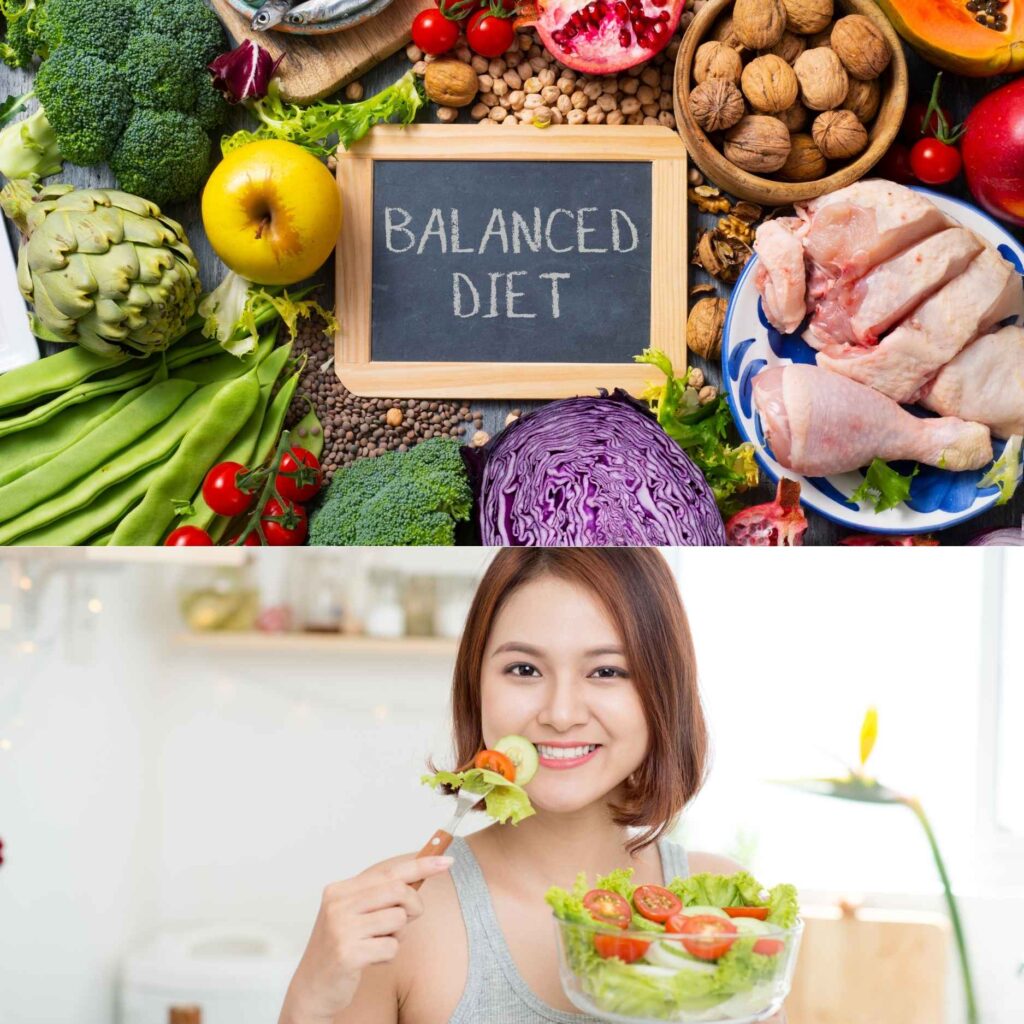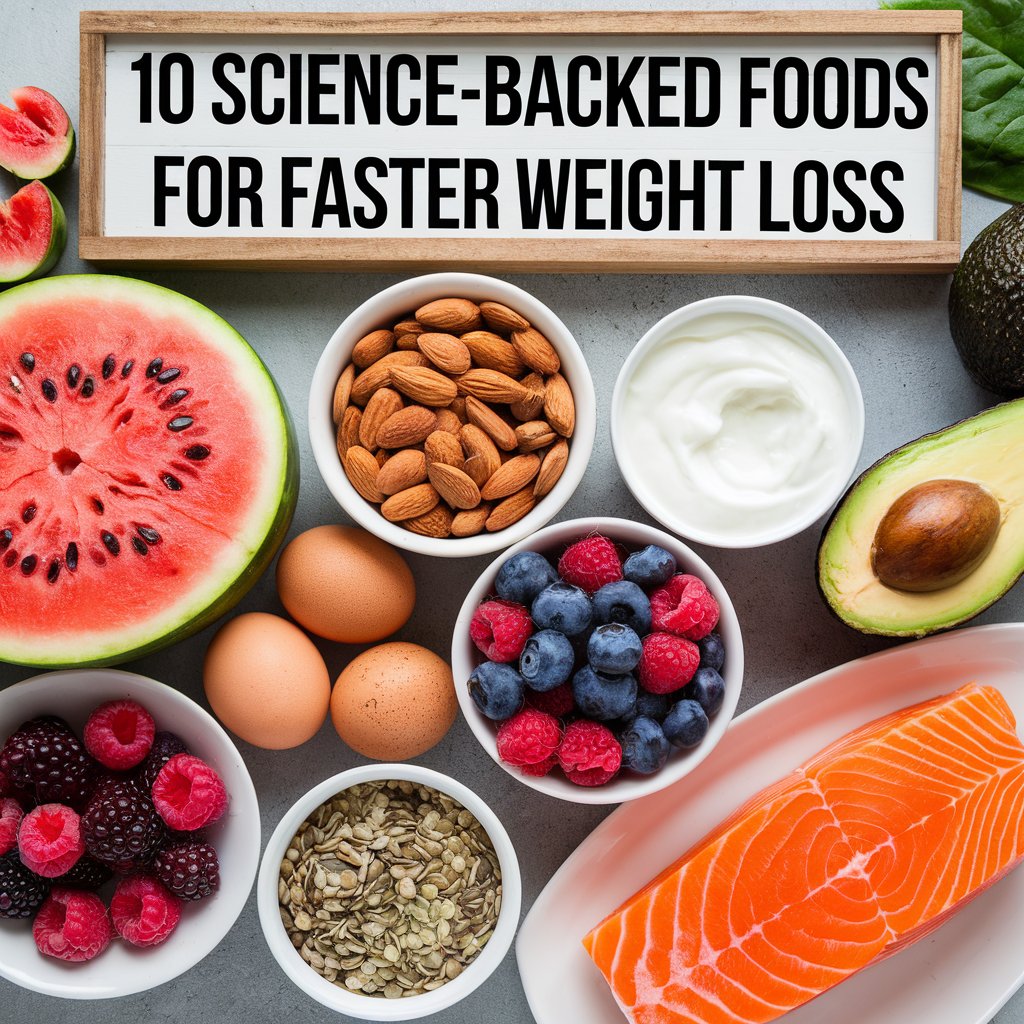Trying to lose weight can be tough, but science has found many natural foods to help. These foods can control hunger and boost your metabolism. They are key to reaching your weight loss goals and living healthier.

Key Takeaways
- Intermittent fasting and calorie tracking can be effective weight loss strategies
- High-protein foods can regulate appetite hormones and increase feelings of fullness
- Limiting refined grains and added sugars can help reduce calorie intake
- Fiber-rich foods can contribute to weight loss by increasing feelings of fullness
- Gut health and sleep quality are important factors in successful weight management
Understanding the Science Behind Weight Loss Foods
To lose weight in a healthy way, it’s important to know how certain foods work. Your body’s metabolic rate is key to burning calories. Eating the right foods can help boost your metabolism.
How Metabolism Affects Weight Loss
Metabolism is how your body turns food into energy. A faster metabolism burns more calories, even when you’re not moving. Age, muscle, and genetics can affect your rate. But, some foods can also help, especially protein-rich and fiber-rich ones.
The Role of Nutrients in Fat Burning
Certain calorie-deficit diet foods can help burn fat. Protein helps control hunger and keeps you full. Fiber slows digestion and keeps you feeling full longer, helping you eat less.
Caloric Deficit and Food Choices
To lose weight, you need to eat fewer calories. You can do this by eating less, moving more, or both. Choosing foods that are both metabolism boosting and nutrient-dense helps you stay healthy while losing weight.
| Nutrient | Effect on Weight Loss |
|---|---|
| Protein | Helps regulate appetite hormones, increases satiety, and preserves muscle mass during weight loss. |
| Fiber | Slows digestion, promotes feelings of fullness, and supports a healthy gut microbiome. |
| Healthy Fats | Provides long-lasting energy, supports hormone production, and may improve fat-burning. |
“Combining physical activity with a reduced-calorie diet and lifestyle changes has shown to lead to a weight loss of 7.2 kg after 6 months to 3 years of follow-up.”
High-Protein Foods That Accelerate Weight Loss
Adding high-protein foods to your diet can change the game for weight loss. These foods keep you full longer and boost your metabolism. This leads to better fat burning. Let’s dive into the science behind the right amount of protein and the best sources for weight loss.

Optimal Protein Portions for Weight Management
The right amount of protein for weight loss is 1.2 to 2.0 grams per kilogram of body weight. Studies show eating more protein can cut daily calorie intake. Overweight women might eat 441 fewer calories, on average.
Higher protein diets also help with body composition, muscle preservation, and less cravings during weight loss.
Best Times to Consume Protein
When you eat protein matters too. Eating a high-protein meal or snack at breakfast or lunch helps keep muscle and reduces hunger. Research shows eating 25% of calories as protein can cut cravings by 60% and nighttime snacking by half.
Plant vs. Animal Protein Sources
Both plant and animal proteins are good for weight loss. Lean meats, fish, eggs, dairy, legumes, and soy-based foods are high in protein. Choose options that are low in saturated fat and minimally processed for the most health benefits.

By mixing different high-protein foods into your diet and timing them right, you can use protein to aid in weight loss. The goal is to find a balanced, sustainable way that fits your needs and preferences.
Fiber-Rich Foods for Sustainable Weight Loss
Adding high-fiber foods to your meals is a smart move for lasting weight loss. These foods make you feel full and control blood sugar, key for weight management.
Whole grains, fruits, veggies, legumes, and nuts are all high in fiber. Aim for 25-30 grams daily for better health and weight control. They’re also low in calories, perfect for weight loss diets.
Eating a mix of high-fiber foods boosts digestion and gut health. It also helps keep weight off for good. Here are some top picks:
- Lentils (16 grams of fiber per cup, cooked)
- Raspberries (8 grams of fiber per cup)
- Artichokes (10 grams of fiber per cup, cooked)
- Chia seeds (10 grams of fiber per ounce)
- Quinoa (5.2 grams of fiber per cup, cooked)
| Food | Fiber Content (per serving) |
|---|---|
| Lentils | 16 grams per 1-cup serving, cooked |
| Raspberries | 8 grams per 1-cup serving |
| Artichokes | 10 grams per 1-cup serving, cooked |
| Chia Seeds | 10 grams per 1-ounce serving |
| Quinoa | 5.2 grams per 1-cup serving, cooked |
By adding these fiber-rich foods to your meals, you’ll help reach your weight loss goals. Plus, you’ll get lots of health benefits from fiber.

10 Science-Backed Foods for Faster Weight Loss
Starting a weight loss journey is a big step. The foods you pick can really help. Research shows some foods can speed up weight loss. These foods are full of nutrients and can help you manage your weight.
Scientific Evidence and Research Studies
Studies have found some foods are better for losing weight fast. For example, a UCLA study found hot chili peppers can burn extra calories. Another study from the University of Toronto showed adding lentils, chickpeas, beans, or peas to your diet can lead to weight loss.
Nutrient Composition Analysis
The nutrients in foods are key for weight loss. Foods like quinoa, oats, and eggs have protein, carbs, and fats. They keep you full and help you eat fewer calories. Greens like spinach and kale are also great because they’re low in calories but full of vitamins and minerals.
Recommended Daily Portions
- Quinoa (1/2 cup cooked)
- Oats (1/2 cup cooked)
- Eggs (2-3 eggs per serving)
- Spinach (1 cup raw or 1/2 cup cooked)
- Kale (1 cup raw or 1/2 cup cooked)
- Lentils (1/2 cup cooked)
- Chickpeas (1/2 cup cooked)
- Green tea (1-2 cups per day)
- Lemons (1-2 wedges per day)
- Papayas (1/2 cup cubed)
Eating these foods every day, in the right amounts, can help you lose weight. It’s a healthy way to reach your goals.

The Power of Whole Grains in Weight Management
Whole grains are key to a healthy weight. They are packed with nutrients and help manage weight. They keep you full and give you energy for a long time.
Studies show whole grains are great for losing weight and staying healthy. Eating 3 servings of whole grains a day can cut heart disease risk by 22%. Adults who eat more whole grains have a 47% lower heart disease risk.
Whole grains offer more benefits. They can lower type 2 diabetes risk if you replace refined grains with them. Eating whole grains also lowers the risk of dying early by 5% for each serving.
To manage weight well, aim for 3 whole grain servings a day. This can help you have a lower BMI and less belly fat. Whole grains are a great choice for a healthy diet.
“Whole grains are essential for weight management due to their high fiber content and nutrient density. They help regulate blood sugar levels and promote feelings of fullness.”
Whole grains are versatile and can be used in many dishes. Try quinoa, brown rice, oats, and whole wheat bread. They make your meals tasty and nutritious.

Choosing whole grains is a smart move for weight management. Switching to whole grains supports a healthy weight. You also get important vitamins, minerals, and antioxidants for your overall health.
Probiotic-Rich Foods for Gut Health and Weight Loss
Adding probiotic-rich foods to your diet can change the game for weight loss. These good bacteria help your gut and control your metabolism and weight.
Understanding the Gut-Weight Connection
Your gut microbiome, full of different microorganisms, affects your health a lot. It’s linked to how you manage your weight. Research shows that the balance of gut bacteria affects how your body uses and stores energy from food.
Best Sources of Natural Probiotics
- Yogurt: It’s good for your bones, heart, and gut. It also lowers diabetes and cancer risks and helps with weight.
- Kefir: This fermented milk is even more packed with probiotics than yogurt. People with lactose intolerance can usually handle it.
- Sauerkraut: This fermented cabbage is full of fiber, vitamins, and antioxidants. It’s also rich in live bacteria when it’s not pasteurized.
- Kimchi: This spicy Korean dish is made from fermented cabbage. It’s full of Lactobacillus kimchii and other bacteria that are good for your gut.
- Miso: This Japanese soybean paste is high in protein, fiber, and vitamins. It might protect against cancer, obesity, and high blood pressure.
- Kombucha: This fermented tea is thought to have health benefits. It might lower cancer and diabetes risks.
Optimal Consumption Timing
Eating probiotic-rich foods regularly, especially with meals, is best. This helps your body use these good bacteria better. It supports your gut health and weight loss.
By eating a variety of probiotic-rich foods, you can help your gut and digestion. This can also help with weight loss. Adding these foods to a balanced diet and regular exercise makes probiotics a great tool for better health.

Healthy Fats That Support Weight Loss Goals
Healthy fats are key for losing weight and staying healthy. They make you feel full, help your body absorb vitamins, and keep blood sugar stable. These are all important for managing weight.
Avocados, nuts, seeds, olive oil, and fatty fish are great sources of healthy fats. They give you essential fatty acids, vitamins, and minerals. Adding them to your meals can make your diet more enjoyable and help you stick to it.
But, too much fat can lead to eating more calories and slow down weight loss. It’s all about finding the right balance. Aim for healthy fats in the right amounts as part of a balanced diet.

The Science Behind Healthy Fats and Weight Loss
Studies have shown that healthy fats help with weight loss and health. A 2020 study found that eating eggs and buttered toast for breakfast made people feel full for 4 hours. Another study from 2007 showed that eating vegetable soup before meals helped people eat less and lose weight.
| Food | Portion Size | Benefits for Weight Loss |
|---|---|---|
| Avocado | 1/2 medium (77.5g) | Increases satiety and provides healthy monounsaturated fats |
| Salmon (raw) | 1 medium fillet (130g) | High in protein and omega-3 fatty acids, supporting metabolism |
| Cashew nuts | 10 individual nuts (10g) | Provide healthy fats and fiber to promote feelings of fullness |
| Chia seeds | 15g | High in fiber and protein, contributing to weight management |
| Olive oil | 1 teaspoon (5ml) | Rich in monounsaturated fats, supports cardiovascular health |
Adding these healthy fats to a balanced diet can help with weight loss. They also offer many other health benefits.
Anti-Inflammatory Foods for Enhanced Fat Burning
Chronic inflammation can make it hard to lose weight. It can lead to weight gain and slow down fat burning. Eating anti-inflammatory foods can help reduce inflammation and support your fat-burning goals.
The Inflammation-Weight Gain Connection
Chronic inflammation can mess with your body’s metabolism. It can cause insulin resistance, hormonal imbalances, and more fat storage. Eating anti-inflammatory foods can help fight this and support fat loss.
Top Anti-Inflammatory Food Choices
Some great anti-inflammatory foods include berries, leafy greens, fatty fish, nuts, and olive oil. These foods are full of antioxidants and omega-3 fatty acids. They help reduce inflammation. Spices like turmeric, ginger, and herbs like green tea also have strong anti-inflammatory effects.

FAQ
What are some science-backed foods for faster weight loss?
For quicker weight loss, try foods like eggs, green tea, and berries. Salmon, Greek yogurt, and leafy greens are also good. Don’t forget chia seeds and nuts.
How does metabolism affect weight loss?
Metabolism is key for losing weight. Certain foods boost your body’s calorie-burning power. Protein, fiber, and eating fewer calories are important.
What is the role of nutrients in fat burning?
Foods rich in nutrients help with weight loss. Whole grains, fruits, veggies, and lean proteins keep you full and regulate blood sugar. They also help your metabolism.
How does caloric deficit contribute to weight loss?
Losing weight needs a caloric deficit. This means eating less and moving more. Eating nutrient-rich foods helps you stay full while cutting calories.
What are the optimal protein portions for weight management?
Protein needs vary by person, but aim for 1.2 to 2.0 grams per kilogram of body weight. Eating protein at breakfast can help you eat less later.
What are the best times to consume protein for weight loss?
Spreading out your protein intake is better than eating it all at once. It keeps hunger hormones in check and makes you feel fuller.
What are the differences between plant and animal protein sources for weight loss?
Both plant and animal proteins can help with weight loss. Options include eggs, lean meats, fish, legumes, and dairy.
How do fiber-rich foods support sustainable weight loss?
Fiber-rich foods are vital for lasting weight loss. They make you feel full and control blood sugar. Include whole grains, fruits, veggies, legumes, and nuts in your diet.
What is the connection between gut health and weight loss?
Your gut microbiome affects metabolism and weight. Foods like yogurt, kefir, sauerkraut, and kombucha support gut health and aid in weight loss.
How do healthy fats contribute to weight loss goals?
Healthy fats are crucial for losing weight and staying healthy. They keep you full, help absorb nutrients, and stabilize blood sugar. Avocados, nuts, seeds, olive oil, and fatty fish are good sources.
What is the relationship between inflammation and weight gain?
Chronic inflammation can make it hard to lose weight and can lead to weight gain. Anti-inflammatory foods like berries, leafy greens, fatty fish, nuts, and olive oil can help fight inflammation and support fat burning.
